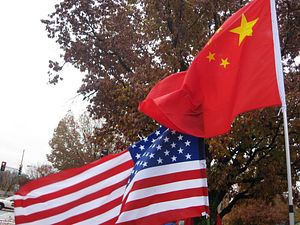On Monday, staff from China’s consulate in Houston, Texas – which was abruptly ordered to close by the U.S. government on July 21 – arrived back in Beijing. They were greeted on the tarmac of the Beijing Capital International Airport by Foreign Minister Wang Yi, who blamed “anti-China forces in the United States” for the steep decline in U.S.-China relations, including the closure of the consulate.
Wang said those “anti-China forces” were “undermining China-U.S. relations and deliberately trying to block China’s development,” according to a paraphrase by Xinhua, China’s state-run news agency.
Those efforts are “going against the tide of history, and it will never succeed!” he proclaimed.
As I discussed in an article for The Diplomat Magazine (and later outlined with Ankit Panda in our geopolitics podcast), China has been framing the downturn in U.S.-China relations as a historical aberration, one that by definition will be short-lived. Beijing seems intent on making this into a self-fulfilling prophecy, with a spate of speeches and articles this summer by Chinese officials driving that point home. The message is twofold: “The trend toward China-U.S. cooperation is unstoppable” (the title of a July speech by Vice Foreign Minister Le Yucheng) and, more importantly, so is China’s rise – its “great rejuvenation,” in the parlance of the China dream.
In his remarks at the Beijing airport, Wang reiterated his belief in both these points. He stated that “China firmly believes that China-U.S. relations will be revived after the current period of difficulty.” He also made clear that trying to stop China’s rise is a fool’s errand: “Under the leadership of the Communist Party of China, no one and no force can stop the nation from moving towards rejuvenation.”
These two points are inextricably related in China’s narrative and deserve further attention. The insistence that the damage done to U.S.-China relations is temporary may sound refreshing, given the current avalanche of negative news. But it is the second point, that China’s rejuvenation cannot be delayed or denied, that holds more weight. The idea is that, because China’s rise is unstoppable, the United States’ efforts to “contain” China are doomed to fail, and eventually will be discarded.
This is why China’s prescription for fixing the relationship involves telling the United States to stop its “wrong remarks and behaviors,” as Vice Foreign Minister Zheng Zeguang put it in a recent video call with members of the U.S. Congress.
In keeping with the narrative that the current tensions are the exception to the rule of U.S.-China cooperation, Zheng blamed the situation on “the regressive moves of a few U.S. politicians.”
“Some American politicians viciously attacked the [Chinese Communist Party] and China’s political system out of their own political interests. They have deliberately distorted and completely negated the history of China-U.S. relations for the past nearly 50 years,” Zheng proclaimed. “What they are up to is to blind the American people and fool international public opinion with lies.”
Zheng’s advice for the relationship follows the same logic: “[P]eople of insight from all walks of life should, in a spirit of being responsible of history and people [sic], take active and collective actions to firmly stop a few U.S. politicians from crazily sabotaging China-U.S. relations out of their selfish interests.”
With its constant references to historical trends and dismissing the current U.S. China policy as the actions of a “few” rogue officials, China is clearly setting the stage for a reset in the event of a Biden victory in the U.S. presidential election this November. If that’s the case, Beijing may be in for a disappointment.
The narrative espoused by officials like Wang and Zheng overlooks how widespread the calls for a new approach to China have become – not only in the United States, but in Europe, Australia, and India, among others. It is tempting to paint the Trump administration’s China hawks as “crazy” (and more than a few in the United States would be inclined to agree), but such rhetoric risks overlooking the much deeper roots of the current crisis in U.S.-China relations. Zheng himself hints at this with his nod to the fact that attacks on China are being motivated by political self-interest. Being “tough on China” is a winning political strategy only because American perceptions of China have soured so drastically in recent years.
The recent publicity blitz by Chinese officials has been labeled “conciliatory” and in one sense it is – there is a clear commitment to U.S.-China cooperation and a desire to return to dialogue. But the key point is that China is not willing to change its own behavior to get there. Quite the opposite, in fact: Zheng made clear in his speech that Beijing would be holding fast to its approach.
“The Chinese government has taken and will continue to take proper and necessary actions to unswervingly safeguard national sovereignty, security and development interests, and unswervingly safeguard and stabilize China-U.S. relations,” he proclaimed. Beijing is apparently unwilling to admit (perhaps even to itself) that those two goals are directly at odds with each other.

































